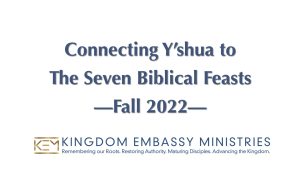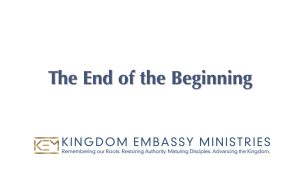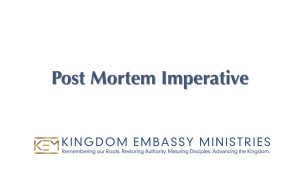Sermon Notes & Videos
2022-10-21 | Genesis 1-6 | Suitable Helper
Weekly Scriptures | Sermon Notes | Sermon Video
 Most Christians are familiar with the creation account in Genesis. And one of the most notable recitals in that account is God’s view on companionship. The idea is so critical that it inspires this revelatory imperative; “It is not good for man to be alone.” As such, God causes a deep sleep to fall upon Adam, and then extracts from within him, a helper comparable to him. Then God commands they reunite in marriage and to be fruitful and multiply. To the unbeliever this likely sounds very absurd, a bit like bad science fiction, and even a little insane, breaking from all reality.
Most Christians are familiar with the creation account in Genesis. And one of the most notable recitals in that account is God’s view on companionship. The idea is so critical that it inspires this revelatory imperative; “It is not good for man to be alone.” As such, God causes a deep sleep to fall upon Adam, and then extracts from within him, a helper comparable to him. Then God commands they reunite in marriage and to be fruitful and multiply. To the unbeliever this likely sounds very absurd, a bit like bad science fiction, and even a little insane, breaking from all reality.
To God’s Children, this should represent the pinnacle of His intent for humanity. And God did not suggest, but commanded them to become one flesh in marriage and to multiply with children. Ah, there it is: the institution of marriage and the traditional family. In today’s culture, even the word “marriage” can trigger feelings once relegated to those intended by four letter words. The myriad of couples, who have endured the horrendous experience of divorce, might be the most trigger-worthy.
A Barna study suggests that for all adults surveyed, the overall percentage of people who had been divorced was 33%. For “born again Christians” it was 32%, and for the atheist/agnostic group it was only 30%. I don’t know about you, but I find these comparisons appalling! Evangelicals fair a bit better at 26%. But, if you want the best chance of staying married, it’s not Christ who makes the biggest difference, but money and ethnicity! Simply being rich lowers your risk of divorce to 22%. Yet, you are best off just being Asian, as they come in at only 20%.
For the unbeliever, it is almost a given that marriage should have a disastrous end. Two humans bound together and living under the same roof with no guiding parameters other than a humanistic perspective, self-help books, and advice from peers living in the same black hole—everything but God. On the other hand, the child of God should be poised for success. We have access to the Holy Spirit along with our Manufacturer’s User’s Manual for life, at our fingertips! So, why are we not experiencing greater results? What seems to be the problem? In today’s study of God’s inspired Word, we will hone in on both the problem and the solution, and on how to become a Suitable Helper!
2022-10-14 | Connecting Y’shua to The Seven Biblical Feasts
 “Let there be lights in the firmament of the heavens to divide the day from the night; and let them be for signs and seasons, and for days and years.” It’s easy to miss. The cycles of the sun and the moon are given for seasons, and for days and years. But, what are the signs? Y’shua rebuked religious leaders for not knowing. “Hypocrites! You know how to discern the face of the sky, but you cannot discern the signs of the times.” Can you discern the signs of the times? Paul assumed you could; “But concerning the times and the seasons, brethren, you have no need that I should write to you. For you yourselves know perfectly that the day of the Lord so comes as a thief in the night… We are not of the night nor of darkness. Therefore let us not sleep, as others do, but let us watch and be sober.” For what signs should you be watching?
“Let there be lights in the firmament of the heavens to divide the day from the night; and let them be for signs and seasons, and for days and years.” It’s easy to miss. The cycles of the sun and the moon are given for seasons, and for days and years. But, what are the signs? Y’shua rebuked religious leaders for not knowing. “Hypocrites! You know how to discern the face of the sky, but you cannot discern the signs of the times.” Can you discern the signs of the times? Paul assumed you could; “But concerning the times and the seasons, brethren, you have no need that I should write to you. For you yourselves know perfectly that the day of the Lord so comes as a thief in the night… We are not of the night nor of darkness. Therefore let us not sleep, as others do, but let us watch and be sober.” For what signs should you be watching?
The yearly cycle of Biblical Feasts is precisely to which Yahweh, Y’shua, and Paul are referring. The Feasts are God’s prophetic calendar for mankind’s history and future. However, if you don’t prioritize their prophetic significance, tragically, you won’t be able to tell what time it is; you won’t be capable of recognizing the signs of the times. Worse yet, you won’t even know what signs to watch for. Let’s take a sobering journey through the yearly Biblical Feast cycle, so you can synchronize your calendar. Then, you will know perfectly what day it is!
2022-10-07 | Deuteronomy 33-34 | The End of the Beginning
Weekly Scriptures | Sermon Notes | Sermon Video
 “It’s time to go over the wall.” Those were his words after I explained what had transpired over the past six weeks. The whole thing seemed to climax on the previous Friday night after I presented “Scorched Earth.” And when I woke on Saturday morning it felt like the first day of Summer vacation. The pressure was off and I was relaxed for the first time in more than a month. I instantly had a vision of a sprinter running through the finish line, breaking the tape. “You run through the tape, not to the tape,” I heard. And then the thought settled in, “Now I can slowly glide to a stop over the next few weeks as we complete this year’s cycle, like a sprinter who slows down gently, so he does not hit the wall.” Run through the tape, not to the tape, and then ease up slowly. This is what I thought would happen, until I woke up on Sunday morning. Summer vacation was over.
“It’s time to go over the wall.” Those were his words after I explained what had transpired over the past six weeks. The whole thing seemed to climax on the previous Friday night after I presented “Scorched Earth.” And when I woke on Saturday morning it felt like the first day of Summer vacation. The pressure was off and I was relaxed for the first time in more than a month. I instantly had a vision of a sprinter running through the finish line, breaking the tape. “You run through the tape, not to the tape,” I heard. And then the thought settled in, “Now I can slowly glide to a stop over the next few weeks as we complete this year’s cycle, like a sprinter who slows down gently, so he does not hit the wall.” Run through the tape, not to the tape, and then ease up slowly. This is what I thought would happen, until I woke up on Sunday morning. Summer vacation was over.
“It’s time to go over the wall.” My dear brother’s words at dinner that night, just days after my vision of the sprinter, had vibrated my eardrums, but not instantly reached my brain. I shook loose from my momentary vacant stare. “Maybe you have to climb the wall, not stop at the wall.” His clarifying words testified to what I already knew to be true. Between those two moments, the vision Saturday morning and dinner the following Thursday night, I had already composed the first of the final two messages, and there was no indication that anything was slowing down. Naturally, the only possibilities would be to climb over or break through, but stopping at the wall was clearly not an option. Something new was coming!
Friday evening I delivered “Post Mortem Imperative.” Then, Saturday morning God gave me yet another vision, this for the young adult study that morning—W. A. R. (Warring Against Repentance). It’s about the internal war against our own repentance, the craving we have to erase our repentant hearts, just so we can cycle back to our lustful sins—cycle back. I woke again Sunday morning to begin preparation, this time for the final chapter in the saga, this very message. As usual, I had great anticipation that the Lord would speak. Although, I have to admit, what He was about to reveal far exceeded anything I could ever imagine.
This short introduction will not suffice; you will need to listen to the message in its entirety. However, I will say this; the plan of cycling through the Torah portions, year-after-year, ending with Deuteronomy 34 and beginning immediately again with Genesis 1, is a double-edged sword. On one edge, by repeating the cycle we learn to recognize and rehearse the amazing patterns from the Torah that inspire New Testament teachings again and again. And, on the other edge, it seems to have engrained something ominous into mankind’s psyche. Why? Because just when it’s time to cross the Jordan into the Promised Land, we learn to STOP! Go back to the beginning and start all over again.
And isn’t that precisely what all of mankind has done, repeatedly? It’s the story of man: command, fail, repent, forgiven… repeat. What are the possibilities if we just keep going? Instead of Deuteronomy and back to Genesis, let’s march straight ahead into Joshua. Let’s go over the wall! Let’s break free of this earth’s gravitational pull. Gravity is a natural phenomenon by which all things with mass are brought toward one another, the force of attraction between any two masses. One mass is mankind, the other is sin! In other words, we are strongly attracted to the gravitational pull of being a sinful human; but what if we just went forward?
What if we accepted that we are no longer just human? What if we brought an end to the beginning? Let’s dare to cross the finish line, accelerate a little, and scale that wall. What’s on the other side? I think it’s what we’ve all been looking for. Dare we believe? Might we look in the mirror one day and see the glory of the Lord staring back at us? Dare we believe?
2022-09-30 | Deuteronomy 31-32 | Post Mortem Imperative
Weekly Scriptures | Sermon Notes | Sermon Video
 It’s a moral imperative, one that does not expire upon death. What could possibly be so crucial, so vitally important, that even death cannot relieve its obligation? We often think in terms of inheritance, succession and legacy, when we think of such things, the stuff left behind after our decease. I wonder what comes to your mind as you contemplate this idea. I’d guess for most of you, it would concentrate somewhere in the subject matter of estate planning and business succession.
It’s a moral imperative, one that does not expire upon death. What could possibly be so crucial, so vitally important, that even death cannot relieve its obligation? We often think in terms of inheritance, succession and legacy, when we think of such things, the stuff left behind after our decease. I wonder what comes to your mind as you contemplate this idea. I’d guess for most of you, it would concentrate somewhere in the subject matter of estate planning and business succession.
Those are important for many reasons, but not the topic of this discussion. And although important, could they ascend to the lofty heights of vital, indispensable, or critical for life and death? I’d say not, and maybe you’d argue. And I suppose we could still return to succession and legacy in search of meaning, with one caveat; remove estate planning and entrepreneurial endeavors from the topics of your probing.
What else is there? What might be the moral imperative; what is so vital, so indispensable, so critical that you must not leave it out of your quest for succession, your pursuit of legacy? I pray that the very fact that we are studying the Bible would give you a clue. And if you take your faith seriously enough and you are willing to take your cues from scripture, you just might see the immeasurable value of leaving this behind for those who will travel this road long after you are gone.
Let’s practice it together. In education it’s called repetition, repetition, repetition. Why? Because repetition contains the DNA of understanding; it’s the matriarch of learning. And if something is so vital, so indispensable, so critical (there goes repetition again), as to effect life and death, I want to “ensure that you always have a reminder of these things after my decease.”
What could be so important to designate as a moral imperative that does not expire upon death? Here it is: “That you may hear, that you may learn to fear, and that you may carefully obey.” These are so imperative for life and death that I call heaven and earth to witness against you regarding such matters. Now, if that warning does not move these priorities to the lofty top in your succession and legacy plan, I think we ought to check your pulse. You might be dead already!
2022-09-23 | Deuteronomy 29-30 | Scorched Earth
Weekly Scriptures | Sermon Notes | Sermon Video | Scorched Earth Declaration and Seal
 Each week I enter in the same way. I sit to read and contemplate the weekly scriptures and on my heart is one burning desire. “Speak to me Father; show me what You want to teach Your children. Highlight the message in Your Word God.” And then I begin to read. I carefully examine each word, each sentence, each concept, all while asking and listening—“Are these the verses? Is this the message?”
Each week I enter in the same way. I sit to read and contemplate the weekly scriptures and on my heart is one burning desire. “Speak to me Father; show me what You want to teach Your children. Highlight the message in Your Word God.” And then I begin to read. I carefully examine each word, each sentence, each concept, all while asking and listening—“Are these the verses? Is this the message?”
I collect the verses and jot down ideas and themes and cross references that flood my mind. I think about what Y’shua might have taught on the subject and Paul, and the gospel writers, and Peter, and James, and the prophets, and David, and Solomon, etc. It’s a lengthy process; it takes many hours. And, it’s the same every week; it has been since Kingdom Embassy Ministries began in 2019… every week, until this week.
I began by opening the Bible and a blank document side-by-side. I do that every time. But the moment I did that this week, everything changed. Immediately, this overwhelming thought burst into my mind before I could read a single word of the Torah portion. It was like a loud angry scream intruding into my brain, as clear as if God was yelling in my ear. “Scorched earth!” I wrote it down at once, and then I paused to wrestle with what it means.
First I prayed; “Yahweh, is this the message? Is it possible you’ve already revealed what I will find in this week’s reading, before I lay my eyes on a single word?” Even then I did not open the Bible. I sought instead to discover the meaning. “What does scorched earth mean?” I had some ideas swimming around in my head, but wanted to be certain. These were my thoughts. This is what I wrote down in my blank document before I did any additional research:
[1. to absolutely annihilate something, to burn it to the ground, leaving only a pile of ashes, like what God did to Sodom and Gomorrah. 2. what we do to others when we kill them with our words, hurt them so badly that they are too battered and bloodied to even mount any defense. 3. Examples: God went “scorched earth” on Sodom, or Jack went “scorched earth” on his ex-girlfriend.]
What I found upon researching was its literal meaning and a few other applications. We won’t go into all the history behind it; I suggest you do a little searching for yourself and discover the horrors of it all.
[1. Scorched earth is used to describe a military policy in which all the houses, crops, factories, buildings, valuable goods, roads and infrastructure, etc., are utterly destroyed, so that your enemy cannot use them. Anything of any value is obliterated! 2. the act of taking every legal method you have at your disposal to cause maximum disruption to those around you without regard for potential social repercussions. 3. At the end of a relationship and knowing how much you despise the person, you ensure that there is never any hope of getting back together by letting everyone know what that person did to you.]
I wondered…is there any semblance of this concept in this week’s Scripture reading? I wondered, but at the same time I didn’t wonder; I was certain there would be. You come to trust God in these matters after years of hearing His voice and knowing His faithfulness. His word never returns void. Then, I opened the Word of God and this is what I read:
“The Lord would not spare him; for then the anger of the Lord and His jealousy would burn against that man, and every curse that is written in this book would settle on him, and the Lord would blot out his name from under heaven.” (Deut. 29:20)
“The coming generation and the foreigner would say, when they see the plagues of that land and the sicknesses which the Lord has laid on it: ‘The whole land is brimstone, salt, and burning; it is not sown, nor does it bear, nor does any grass grow there, like the overthrow of Sodom and Gomorrah, Admah, and Zeboiim, which the Lord overthrew in His anger and His wrath.’” (Deut. 29:22-23) Scorched earth… need I say more?
2022-09-16 | Deuteronomy 26-29 | Available!
Weekly Scriptures | Sermon Notes | Sermon Video
 {August 15, 2022} I was dreaming and I was somehow aware I was dreaming. And in the dream there were two of me. I saw myself in the dream and I was also in the dream seeing myself, so I guess there were three of me. I was in heaven, and one of me was dead. He was the one sitting at the desk, and the other me was watching from a short distance. It was an ethereal scene with puffy white clouds. It was heaven, but all three of me knew it was allegorical, more like a movie version of heaven.
{August 15, 2022} I was dreaming and I was somehow aware I was dreaming. And in the dream there were two of me. I saw myself in the dream and I was also in the dream seeing myself, so I guess there were three of me. I was in heaven, and one of me was dead. He was the one sitting at the desk, and the other me was watching from a short distance. It was an ethereal scene with puffy white clouds. It was heaven, but all three of me knew it was allegorical, more like a movie version of heaven.
The me being observed was sitting at a desk being interviewed by an angelic being. The interview had only one exchange, and it was not a question, but rather a directive. It was a simple, yet profound request; “Describe your entire life with one word.” The two observers, the me in the dream watching and the me dreaming were completely aware of the magnitude of what he was asked to contemplate. We became excited and curious. What word would he choose? We truly didn’t know.
What we did know is that long ago I identified five core values that animated my life: virtue, integrity, justice, innovation, and influence. Each word had deep significant meaning; each, if unpacked, explained an essential element of what I held most dear. Those five words guided my character and commitment. Which word would he choose? Or, would he choose another? We were fascinated as we observed the dead me answer the challenge. I sat there at the desk. It was a sober moment, a watershed moment. Both onlookers pondered, as the dreaming me laying in bed, and the observing me who watched inside the dream, could feel our racing heart escalate. It pounded with such anticipation. He stared at his angelic Interrogator and without hesitation offered one word with complete confidence… “Available.” Available? And then I woke!
I sat straight up in bed, my beautiful bride in a deep restful sleep next to me, and I instantly wrestled with the idea. Available? Immediately, in a sober, self-reflective moment, I sought the Lord.
No, not three of us, not the man at the desk, and not the man observing from a short distance, but me—awake, and completely aware of the transaction that just occurred. I confessed, “O God, if you required this of me at this very moment, if I had to give You one word right now, I could not do it. I can’t describe my life with one word; I need two words Lord.”
I was disappointed in myself, but not in a self-condemning way. It was the type of disappointment that inspires a steadfast resolve to change something, the type that comes when you look in the mirror and admit the unadulterated truth. “Mostly available!” That’s what I confessed to the Lord that morning; that’s what I confessed to myself. “I love You Lord, and I love Your people, and I want to serve you with reckless abandon! Yet, their is still some small part of me that is holding onto something for myself.” God does not want most of me, even if it’s 99.99%. He wants all of me.
Something else happened that day. I made a decision that when I die, when I sit at that allegorical desk, alone, with no observers—just me, I will say to my Interrogator, “Available.” That’s the one word I can use to describe my life Lord. “I am…available!”
Let the journey begin!
